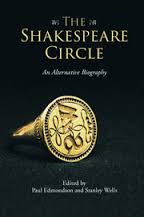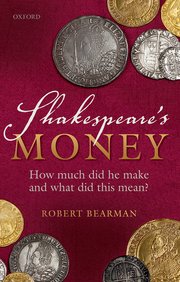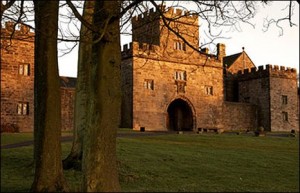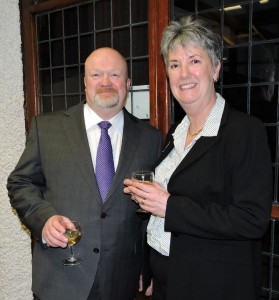 In the last week or so I’ve been hearing about, and reading about, Shakespeare’s parents, who they were, what they were like, and how his family life might have impacted on his career. In her afterword to the new book *The Shakespeare Circle, Margaret Drabble suggests “to receive interesting answers you have to ask interesting questions”, and the authors I’ve been reading, David Fallow and Helen Moorwood, have asked questions about whether the conventional view is the right one. The answers that they’ve come up with, though, are completely different.
In the last week or so I’ve been hearing about, and reading about, Shakespeare’s parents, who they were, what they were like, and how his family life might have impacted on his career. In her afterword to the new book *The Shakespeare Circle, Margaret Drabble suggests “to receive interesting answers you have to ask interesting questions”, and the authors I’ve been reading, David Fallow and Helen Moorwood, have asked questions about whether the conventional view is the right one. The answers that they’ve come up with, though, are completely different.
For some perspective I’ve also been looking at the more conventional biographies by Stephen Greenblatt and Michael Wood. Greenblatt’s book Will in the World is subtitled How Shakespeare became Shakespeare“, and he spends a good deal of time picking over the “mountains of speculation” relating to the years after Shakespeare drops out of the official records in Stratford before he reappears as an actor and playwright in London some seven years later: during this period he somehow became Shakespeare.
Neither Fallow nor Moorwood try to establish exactly what Shakespeare was doing from around 1582 to 1589. Neither has uncovered new documentary evidence, for instance. but both have done vast amounts of research, and try to persuade us that their perspective is correct. For both of them, what Shakespeare was doing in his “lost years” depends on his family connections and their backgrounds.
Helen Moorwood’s latest book on the Lancastrian theory, Shakespeare at Hoghton Tower, 1579-81 is over two hundred closely-packed pages long, so I hope she’ll excuse me if I offer only a sketch of her ideas. She’s already examined the epitaphs for the Stanley family in the church at Tong in Shropshire, traditionally said to have been written by Shakespeare, and she now closes in on the theory that I first encountered in Ernst Honigmann’s book Shakespeare in Lancashire. This links Shakespeare with the Catholic Hoghton and Hesketh families, and in particular with Alexander Hoghton’s 1581 will in which a man called William Shakeshafte, probably a player or musician, was mentioned. In his book In Search of Shakespeare Michael Wood examines these theories but concludes they are “curious coincidences” rather than facts.
Moorwood herself comes from a Lancashire family, and her investigations lead her to believe that “William Shakespeare’s blood was from Lancashire”. She proposes that John Shakespeare, William’s father, was actually John Shakeshafte, who is registered as a glover in Preston in 1562 and 1582, and not related to the Shakespeares of Snitterfield. She suggests he set up business in Stratford in the 1540s or 1550s and by 1552 had married a wife with whom he had a number of children including William. After this wife’s death around 1574 John then married the widowed Mary Arden, daughter of Robert Arden of Wilmcote, whose family was originally from Cheshire. As Mary Arden was not his mother Shakespeare could not impale the Shakespeare coat of arms with the Arden one, though this had been approved for John Shakespeare. Heraldry certainly isn’t my subject, but this explanation of the inconsistencies relating to the Shakespeare coat of arms seems, well, far-fetched. I apologise if I have missed Moorwood’s explanation, but surely if John’s first wife had died and he had remarried in the 1570s these events would feature in parish records. There are gaps in the record, like Shakespeare’s own marriage, but the Stratford records and those of neighbouring parishes accurately record most births and deaths. Helen Moorwood’s book is not available for purchase but there is information on her website.
On Tuesday David Fallow, who has a formidable background in finance, spoke to the Stratford Shakespeare Club on his research into the life of John Shakespeare for which he has earned a doctorate. His argument (again I’m summarising a complex theory) is that John Shakespeare never lost his money as the conventional story goes. Instead, after a government crackdown on illegal wool trading he lowered his profile, tactically “selling” his land at giveaway prices to relatives to avoid paying tax. William left school early in order to help his father run his business and went to London to act as his father’s agent, looking after his business concerns. This idea has received quite a lot of press attention and Fallow has contributed a chapter to the recently published book *The Shakespeare Circle where the argument is set out more fully. Documents certainly show that John Shakespeare was more than a humble glove-maker, and was involved in illegal dealing in wool, but there are still lots of questions. If John Shakespeare was not in financial difficulties, but merely lying low, why did his colleagues on the Council in Stratford protect him from paying fines like the 1578 levy on strengthening the militia, or, particularly, the levy to cover poor relief?
As a Stratfordian through and through I can’t say I’m convinced by the theories of either Helen Moorwood or David Fallow, thought-provoking though they both are: there are at least as many gaps and suppositions in them as there are in the “official” histories.
 At the end of March archivist Robert Bearman’s book Shakespeare’s Money: how much did he make and what did this mean? is to be published by Oxford University Press. Bearman has been studying the Shakespeare documents, and the documents relating to Stratford, for over forty years, and I believe he comes to very different conclusions from Fallow. We shall have to wait and see.
At the end of March archivist Robert Bearman’s book Shakespeare’s Money: how much did he make and what did this mean? is to be published by Oxford University Press. Bearman has been studying the Shakespeare documents, and the documents relating to Stratford, for over forty years, and I believe he comes to very different conclusions from Fallow. We shall have to wait and see.
* The Shakespeare Circle: an Alternative Biography, edited by Paul Edmondson and Stanley Wells. Published by CUP 2015.




Agree……..if John Shakespeare was an (presumably) unknown Lancastrian interloper, then how did he rise – so smoothly – to prominence on Stratford’s council? [first appointed in 1556 when he was 25yrs old].
Also, if he had been an ‘incomer’ rather than a ‘local’, then why would the council have tolerated his absences and problems for so long?
Can’t see it.
Whilst I am very attracted to the theory that bright young William Shakespeare may have sought a teaching position in Lancashire……one has to ask, if in reality, the family’s eldest child would be more likely to stay put and help keep bread on the family table.
Haven’t read every biography, but I think Schoenbaum’s views on WS’s family background are pretty good.